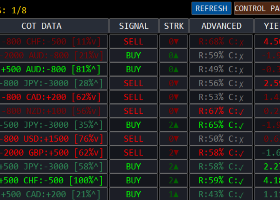What is Quantitative Finance?
Quantitative finance (also known as mathematical finance or financial engineering) is the application of mathematical theory to the financial domain. It is a very broad term, covering many activities within the financial markets. However, it usually refers to three main areas:
Derivatives/Options Pricing - Derivatives are a form of contingenent claim contract that specify a pay-off or transaction under certain conditions. Mathematical methods such as stochastic calculus can be used to price the value of these contracts. This is the often the domain of a quantitative analyst in an investment bank.
Quantitative Trading - Asset management firms, and in particular hedge funds employ strategies to trade assets in the financial markets. In recent years, the sophistication of such strategies has increased significantly, with many now being fully automated and at a very high frequency. Quantitative traders are often employed to make use of statistical methods to improve the results of such strategies.
Risk Management - Many firms will transact risk as part of their core services. This is particularly true of investment banks. Risk management often requires quantitative techniques (mainly statistical) to make predictions about the effects on a portfolio of assets in the case of "extreme" events. Quants are often employed by such firms to produce and refine these models.
This is not a comprehensive list of activities which fall under quantitative finance but it does cover the main areas.

Why study to become a Quantitative Analyst?
There are many reasons to become a quant and they reflect different aspects of the prospective candidate:
- Intellectual Stimulation - Outside of academia/engineering, the majority of career options will not provide a mathematically-trained individual with much need to flex their numerical muscles. Quantitative finance is an exception to this, as it requires graduate level mathematics, statistics and programming ability in order to implement the sophisticated quantitative models that can be found in the globe's financial hubs.
- Smart and Ambitious Peers - Often the organisation(s) you will end up working for will employ talented individuals from diverse backgrounds. You will be more often than not be pushed to continually improve your skillset and training. For those who are ambitious, a career in finance can be extremely rewarding.
- Lucrative Compensation - The financial industry is often noted for its above-average compensation "packages". It is expected that an individual close to the "front office" in either a bank or fund will receive a bonus comparable to - or in excess of - their base salary, which will almost certainly be higher than other technical industries. Not only that but this total compensation will rise in a geometric fashion, whereas other career progressions tend to have a more linear increase in pay-scale with experience. For some, this is a highly attractive aspect of the job.
For me personally, I was interested in the first and second reasons
when I began my career in finance. Although better pay is attractive, it
cannot make up for shortfalls in intellectual stimulation or poor
working relationships. Hence you should concentrate on finding a great
place to work, with smart, fun colleagues. Do not concentrate solely on
the money or you will be disappointed with a career in finance.
Where can I get a Job as a Quant?
There are many types of firms which require the skills of a quantitative analyst. Traditionally, the main employers have been large-scale investment banks with proprietary trading groups and risk management departments. These are the firms that tend to employ quants with derivatives pricing skills.
Recently, however, there has been a shift towards a need for quantitative traders, often in hedge funds or other asset management firms. This has put statistical and programmatic ability at the top of the required skillsets. In fact, certain Masters programs in Financial Engineering are veering away from raw derivatives pricing material (such as stochastic calculus, Partial Differential Equations, Black-Scholes etc) towards statistical techniques, risk management, quantitative trading methods and programming skills.
However, there has recently been a growth in software companies that specialise in risk management tools or other financial technology. Some of these firms are becoming extremely sophisticated and manage their own teams of quantitative analysts. Examples of such firms are web-based portfolio management tools, sports betting exchanges, web-based brokerages and spread-betting firms.
Clearly there is a lot of choice in quantitative finance, for a successful, diverse and interesting career.



